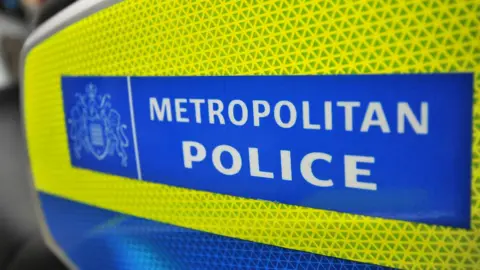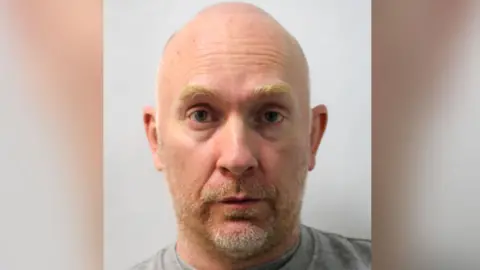Met officers investigated for sexual misconduct working as normal
 PA Media
PA MediaMore than 100 Metropolitan Police officers being investigated for sexual misconduct are currently working without restrictions, figures reveal.
The Liberal Democrats have found that as of 3 February, more than a quarter of 548 officers being investigated for domestic abuse and sexual misconduct were working as normal.
The party said the figures "undermine public trust".
The Met said it was working to rebuild trust with communities.
Of the 548 officers being investigated for sexual misconduct and domestic abuse claims, 111 were working as normal, according to a Freedom of Information request (FOI) submitted by the Liberal Democrats.
A further 236 have been placed on restricted duties, 71 have been suspended and 97 have left the force.
The FOI revealed that 111 of 361 officers being investigated solely for sexual misconduct were still undertaking normal duties.
The sexual and domestic abuse allegations could have come from both the public or from within the force.
The new figures come in the week the force is expected to be heavily criticised for being racist, sexist and homophobic in a report by Baroness Casey.
She was appointed to review the force's culture and standards after the murder of Sarah Everard by serving officer Wayne Couzens.
The report is also expected to criticise how the Met protects its own people ahead of the public.
 Met Police
Met PoliceThe force is already facing a separate independent inquiry into how Couzens and the serial rapist officer David Carrick were able to become policemen and were not identified as threats to women.
The interim Casey review published in October found hundreds of Met officers had been getting away with breaking the law and misconduct.
'Betrayal of survivors'
A spokeswoman for the force said the status of officers under investigation was regularly reviewed and can change throughout the process.
Liberal Democrat MP for North East Fife and former police officer Wendy Chamberlain said the latest figures were "horrifying".
"The fact that it's business as usual for dozens of officers under investigation for sexual misconduct is a betrayal of survivors everywhere.
"We need swift action and proper answers from the Met about how they determined which officers should be allowed to continue working as normal - and how their vetting procedures allowed for this in the first place," she said.
Deputy Assistant Commissioner Helen Millichap said: "We recognise identifying and bringing to justice those in the Met who corrupt our integrity by committing abuses against women and girls is vital in rebuilding the trust of our communities and increasing reporting."
Steps were being taken towards this goal through expanding and creating new units to investigate officers, she added.
Asked if it was too difficult for police forces to sack officers, Helen King, former assistant commissioner at the Met, said "there is clear evidence that the current system doesn't work".
Speaking to Radio 4's Today programme, she pointed to a recent case which saw British Transport Police launching a judicial review in order to remove an officer from its own force.
PC Imran Aftab had been found guilty of gross misconduct by a disciplinary panel but was given a final written notice rather than a dismissal, until Chief Constable Lucy D'Orsi took the matter to the High Court.
But as well as changes to the rules, Ms King said, police leaders needed to "put the resourcing and expertise into making sure that those who shouldn't be carrying a warrant card aren't able to do so".


Have you been affected by the issues raised in this story? Please email us: haveyoursay@bbc.co.uk.
Please include a contact number if you are willing to speak to a BBC journalist. You can also get in touch in the following ways:
- WhatsApp: +44 7756 165803
- Tweet: @BBC_HaveYourSay
- Or fill out the form below
- Please read our terms & conditions and privacy policy
If you are reading this page and can't see the form you will need to visit the mobile version of the BBC website to submit your question or comment or you can email us at HaveYourSay@bbc.co.uk. Please include your name, age and location with any submission.

Follow BBC London on Facebook, Twitter and Instagram. Send your story ideas to hellobbclondon@bbc.co.uk